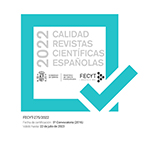Emigración transatlántica e integración laboral: mulleres galegas no sur do Conurbano bonaerense (1890-1960)
Resumen
Aínda que nas últimas tres décadas os nosos coñecementos acerca dos emigrantes de Galicia na Arxentina experimentaron notables avances, continúa sendo pouco o que sabemos en relación coa problemática particular das mulleres galegas no país, particularmente no que respecta á súa integración económica. Certamente, tanto as fontes oficiais arxentinas como as das asociacións de étnicas galaicas no país presentan importantes limitacións á hora de indagar na integración feminina na súa faceta laboral, mais o baleiro debe atribuírse en última instancia ao “discurso da domesticidade”, que santificou o fogar como un espazo no que a muller desenvolvía a súa misión de responsable da reprodución física e moral da familia, mentres ao home lle correspondían as tarefas rentadas fóra da casa. De alí, en boa medida, o subrexistro e a falta de percepción do fenómeno do traballo feminino. A partir da información consignada en dúas fontes de tipo nominativo e nos testemuños recollidos a partir de entrevistas a emigrantes galegas ou aos seus familiares, abordamos a inserción socioprofesional de migrantes galegas radicadas nos municipios bonaerenses de Avellaneda e Lanús entre 1890 e 1960, procurando botar luz tanto sobre o seu rol economicamente activo como sobre a integración que alcanzaron no sector secundario da economía da zona.
Descargas
Descarga artículo
Licencia
La revista Madrygal. Revista de Estudios Gallegos, para fomentar el intercambio global del conocimiento, facilita el acceso sin restricciones a sus contenidos desde el momento de su publicación en la presente edición electrónica, y por eso es una revista de acceso abierto. Los originales publicados en esta revista son propiedad de la Universidad Complutense de Madrid y es obligatorio citar su procedencia en cualquier reproducción total o parcial. Todos los contenidos se distribuyen bajo una licencia de uso y distribución Creative Commons Reconocimiento 4.0 (CC BY 4.0). Esta circunstancia ha de hacerse constar expresamente de esta forma cuando sea necesario. Puede consultar la versión informativa y el texto legal de la licencia.








